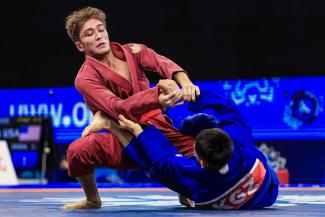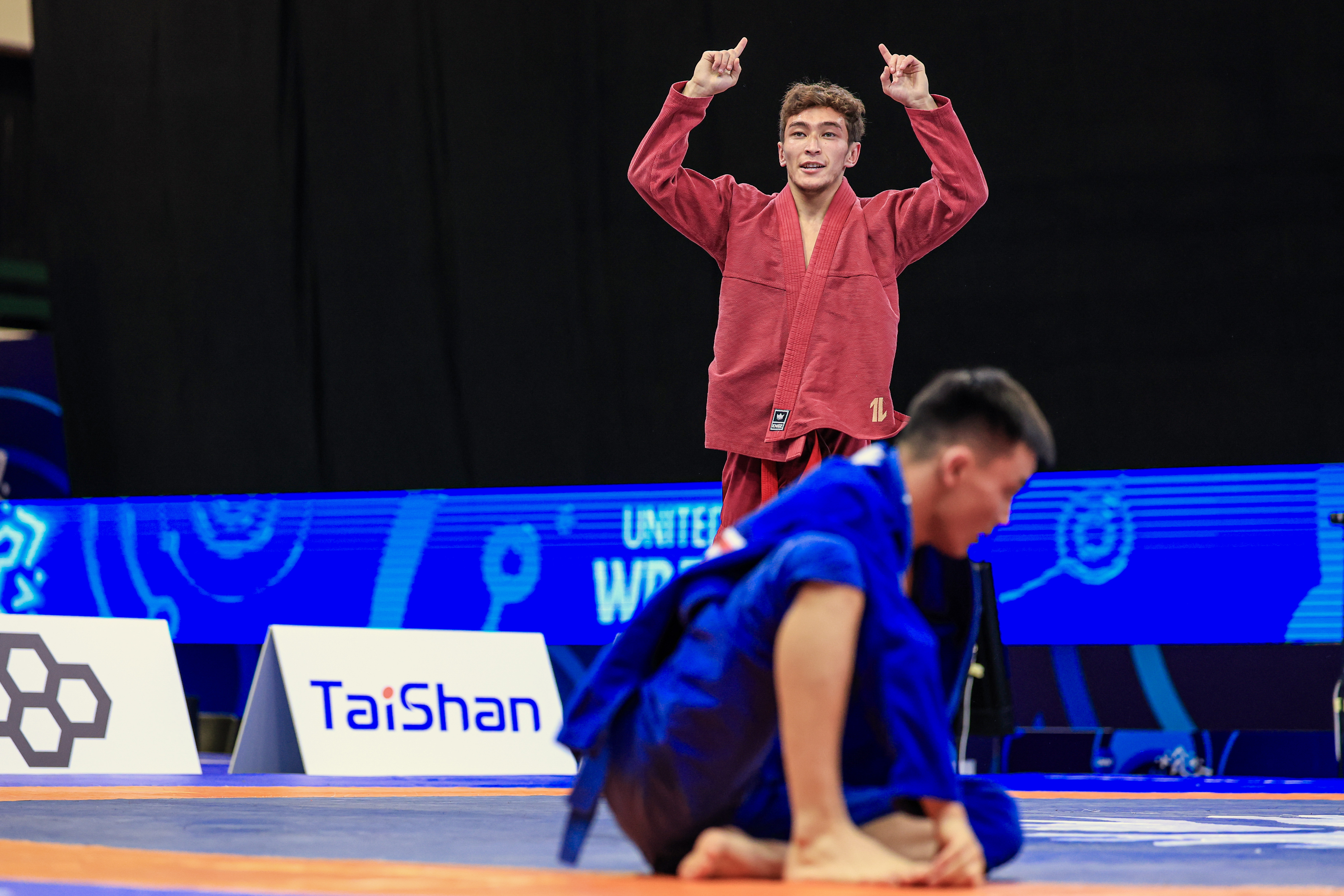Youngest wrestlers heading to Paris 2024
Monday, July 15, 2024 - 12:18 By Eric Olanowski

PARIS, France (July 15) — As we approach the Paris 2024 Olympic Games (August 5-11), fans' attention will be split between the already-established stars and a promising new wave of Olympians aiming to make their mark in history.
Out of the 290 athletes (288 athletes + 2 refugees) bound for Paris 2024, 19 wrestlers under 21 can potentially become some of the youngest Olympic champions ever. Here’s how they break down by age:
18 years old: 1 wrestler
19 years old: 1 wrestler
20 years old: 5 wrestlers
21 years old: 12 wrestlers
Women’s wrestling dominates the youth spotlight, boasting the six youngest wrestlers in the field. There are 19 competitors under 21 years old, with freestyle and Greco-Roman each having seven wrestlers under this age bracket.
Xu WANG (CHN) remains the youngest-ever Olympic champion in women’s wrestling, a record now standing for over two decades. Wang clinched the 72kg gold at the Athens 2004 Games at just 18 years, 10 months and 27 days old.
Among the Paris contenders, Sol Gum PAK (PRK) stands out as the only wrestler young enough to challenge Wang’s enduring record. Born on November 2, 2005, Pak will compete in the 68kg category on August 5, with a chance to break the record on August 6. If she reaches the gold-medal bout, she’ll be 18 years, 9 months and 4 days old, surpassing Wang by 1 month and 23 days.
While Pak aims for history, rising star Antim Antim (IND) can also make waves in women’s wrestling by potentially surpassing Kaori ICHO (JPN) with a gold medal in the 53kg category.
Antim, at 19 years, 11 months and 8 days, would edge out Icho’s age of 20 years, 2 months and 10 days during her Athens 2004 victory.
Elsewhere, young talents and reigning world champions Amit ELOR (USA), Akari FUJINAMI (JPN) and Nonoka OZAKI (JPN) will also be looking to leave a last impression on the record books.
Fujinami, who heads into Paris with a 120+ match winning streak, is the third youngest women’s wrestler. If Fujinami, the two-time world champion, comes out on top as most expect, she’d move into the No. 4 slot on the list, just ahead of London 2012 champ Natalya VOROBIEVA (RUS), who won at 21 years, 2 months and 13 days old.
Fujinami would be 21 years and 10 months old on the day of the 53kg finals.
If Elor, aged 20 years, 7 months, and 4 days, secures victory in the 68kg bracket on August 6, she will become the third-youngest women’s wrestling Olympic champion, beating Jiao WANG’s age by nine days (20 years, 7 months, and 13 days).
Ozaki is aiming for a top-five spot, potentially overtaking Risako KAWAI (JPN), who was 21 years, 8 months, and 28 days old during her Rio 2016 victory. Ozaki, at 21 years, 4 months, and 13 days, could achieve this if she triumphs in France.
In Greco-Roman wrestling, Islambek ALBIEV (RUS) holds the record as the youngest Olympic gold medalist, set at the Beijing 2008 Games at 19 years, 7 months and 15 days old.
Saied ESMAEILI, turning 21 on July 15, is the youngest competitor in the Greco-Roman field for Paris 2024. While Esmaeili is “too old” to challenge the top six spots, he could potentially become the seventh-youngest Greco-Roman Olympic champion, surpassing Boris GUREVICH’s (URS) age of 21 years, 4 months, and 4 days if he wins the 67kg final on August 8.
In freestyle wrestling, Aman AMAN (IND), Akhmed TAZHUDINOV (BRN), and Rahman AMOUZAD are the youngest contenders on the entry list.
Aman, presently 20 years old but is turning 21 on July 16, is the youngest freestyle wrestler. He isn’t within reach of the youngest-ever title, currently held by Saban TRSTENA (YUG), who won gold at 19 years, 7 months and 9 days in Los Angeles 1984. But if Aman wins gold on August 9-10, aged 21 years, 0 months, and 25 days, he will rank as the 11th youngest Olympic champion, overtaking George DE RELWYSKOW (GBR), who won gold at the 1908 London Games at 21 years, 1 month and 6 days old.
While Amouzad is just out of reach of breaking into the top 15, Tazhudinov, who’ll be 21 years, 7 months and 24 days old on August 11, would steal the No. 14 spot from Hassan YAZDANI (IRI) by seven days.
Wrestling at the Paris Olympic Games starts Agust 5-11 and can be followed on www.uww.org.
Top-15 youngest Paris 2024 Entries:
1. Sol Gum PAK (DPRK) - 18 years old | November 2, 2005 |WW
2. Antim Antim (IND) - 19 years old | August 31, 2004 |WW
3. Amit ELOR (USA) - 20 years old | January 1, 2004 |WW
4. Akari FUJINAMI (JPN)- 20 years old | November 1, 2003 | WW
5. Kennedy BLADES (USA) - 20 years old | September 4, 2003| WW
6. Gabija DILYTE (LTU) - 20 years old | September 3, 2003 | WW
7. Aman AMAN (IND) - 20 years old | July 16, 2003 | FS
8. Saied ESMAEILI (IRI) - 21 years old | July 15, 2003 | GR
9. Aurora RUSSO (ITA) - 21 years old | June 3, 2003 | WW
10. Nonoka Ozaki (JPN) - 21 years old | March 23, 2003 | WW
11. Akhmed TAZHUDINOV (BRN) - 21 years old | January 25, 2003 | FS
12. Alireza MOHMADIPIANI (IRI) - 21 years old | October 30, 2002 | GR
13.Hasrat JAFAROV (AZE) - 21 years old | October 5, 2002 | GR
14. Zaineb SGHAIER (TUN) - 21 years old | September 25, 2002 | WW
15. Amirali AZARPIRA (IRI)- 22 years old | March 26, 2002 | FS


 Alikhan ALSHINBAY (KAZ) celebrates after winning the 58kg final in Grappling Gi. (Photo: United World Wrestling / Amirreza Aliasgari)
Alikhan ALSHINBAY (KAZ) celebrates after winning the 58kg final in Grappling Gi. (Photo: United World Wrestling / Amirreza Aliasgari)
Share your thoughts.
Comments